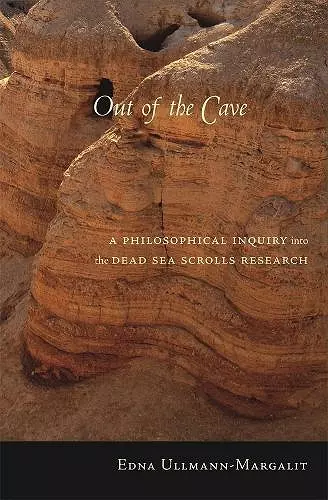Out of the Cave
A Philosophical Inquiry into the Dead Sea Scrolls Research
Format:Hardback
Publisher:Harvard University Press
Published:14th Jun '06
Currently unavailable, and unfortunately no date known when it will be back

Ullman-Margalit says that '[m]y subject matter is not the scrolls but the study of the scrolls; I engage in research about scrolls research and delve into its inner logic.' I think she has successfully carried out what she intends to do, and she has done so in a clear and appealing style. I know of no other work like it. It provides sensible, honest evaluations and comes to reasonable conclusions. -- James VanderKam, the University of Notre Dame There is a lull in Dead Sea Scrolls scholarship now, and this book tells us where we have been and what we need to do. It may well provide a theoretical impetus to further reflection. It also offers an interesting test case as to how 'scientific' scholarship works in literature, history, and archaeology regarding methods, achievements, and limitations. The book is well informed, clearly written, and understandable for nonspecialists. The blend of Dead Sea Scrolls scholarship and analytical philosophical reasoning makes an interesting and unique combination. No other book examines in such depth the logic underlying the debates about the Dead Sea Scrolls and why they remain so controversial. This book represents a good summary of where we have been and might provide a bridge to future scholarship. It will interest Dead Sea Scrolls specialists, biblical scholars, and archaeologists, as well as the general public. It is a readable and stimulating work, which might play a salutary role in the history of Dead Sea Scrolls scholarship. It identifies the problems, and clarifies what we know and do not know, and tells us why. -- Daniel J. Harrington, Weston Jesuit School of Theology
Since the inception of Dead Sea Scrolls research, a central theory has emerged, which asserts that the scrolls belonged to the Essenes, a sect whose center was at the nearby site of Qumran. Philosopher Edna Ullmann-Margalit focuses on this theory, exploring the different arenas, and ways, in which contesting theories of the scrolls do battle.
More than fifty years ago the discovery of scrolls in eleven caves beside the Dead Sea ignited the imagination of the world--and launched a vast academic field. Expectations abounded that the scrolls would reveal actual contemporaneous accounts of the birth of Christianity, perhaps even of the life of Jesus. The research that followed--its inner logic, and what its impassioned and often highly controversial theories reveal about the framing of facts and the interpreting of texts--is what interests philosopher Edna Ullmann-Margalit in this thoroughly absorbing book.
Since the inception of Dead Sea Scrolls research, a central theory has emerged. Known as the Qumran-Essene Hypothesis, it asserts that the scrolls belonged to the Essenes, a sect whose center was at the nearby site of Qumran. In Out of the Cave, Ullmann-Margalit focuses on this theory and the vicissitudes of its career. Looking at the Essene connection, the archaeology of Qumran, and the sectarian nature of the scrolls community, she explores the different arenas, and ways, in which contesting theories of the scrolls do battle. In this context she finds fascinating examples of issues that exercise philosophers of science as well as the general public--issues that only amplify the already intrinsic interest of the Dead Sea scrolls.
Ullman-Margalit says that '[m]y subject matter is not the scrolls but the study of the scrolls; I engage in research about scrolls research and delve into its inner logic.' I think she has successfully carried out what she intends to do, and she has done so in a clear and appealing style. I know of no other work like it. It provides sensible, honest evaluations and comes to reasonable conclusions. -- James VanderKam, the University of Notre Dame
There is a lull in Dead Sea Scrolls scholarship now, and this book tells us where we have been and what we need to do. It may well provide a theoretical impetus to further reflection. It also offers an interesting test case as to how 'scientific' scholarship works in literature, history, and archaeology regarding methods, achievements, and limitations. The book is well informed, clearly written, and understandable for nonspecialists. The blend of Dead Sea Scrolls scholarship and analytical philosophical reasoning makes an interesting and unique combination. No other book examines in such depth the logic underlying the debates about the Dead Sea Scrolls and why they remain so controversial. This book represents a good summary of where we have been and might provide a bridge to future scholarship. It will interest Dead Sea Scrolls specialists, biblical scholars, and archaeologists, as well as the general public. It is a readable and stimulating work, which might play a salutary role in the history of Dead Sea Scrolls scholarship. It identifies the problems, and clarifies what we know and do not know, and tells us why. -- Daniel J. Harrington, Weston Jesuit School of Theology
[Ullmann-Margalit's] critical study goes far to explain why even today the Scrolls remain objects of fierce controversy...For all those interested in the Dead Sea Scrolls, Out of the Cave provides a lucid intellectual structure for the classification and evaluation of Qumranologists. But the book could also serve as an introductory text in philosophy of science. Introducing, with an admirably light touch, classical theories from Bayes to Popper and currently popular models of inference to the best explanation, the author uses scrolls research as a test-bed for the logic of discovery and argument in the human sciences. -- Anthony Kenny * Times Literary Supplement *
ISBN: 9780674022232
Dimensions: unknown
Weight: unknown
168 pages